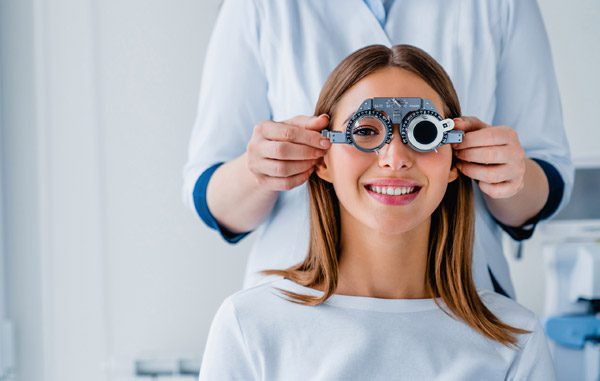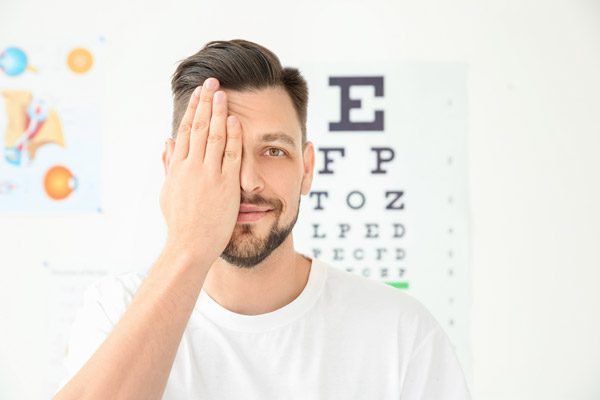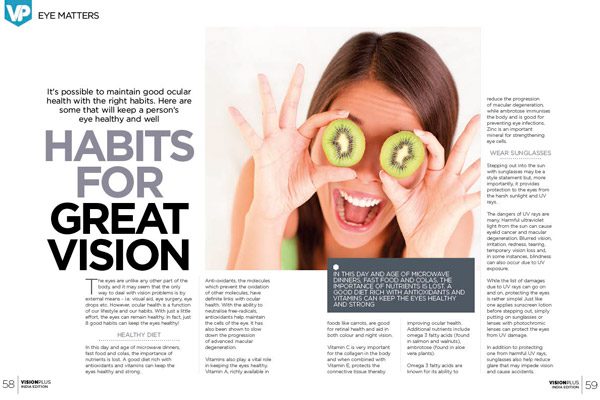
Habits For Great Vision
It's possible to maintain good ocular health with the right habits. Here are some that will keep a person's eye healthy and well
The eyes are unlike any other part of the body, and it may seem that the only way to deal with vision problems is by external means - i.e. visual aid, eye surgery, eye drops etc. However, ocular health is a function of our lifestyle and our habits. With just a little effort, the eyes can remain healthy. In fact, just 8 good habits can keep the eyes healthy!
Healthy Diet
In this day and age of microwave dinners, fast food and colas, the importance of nutrients is lost. A good diet rich with antioxidants and vitamins can keep theeyes healthy and strong.
Anti-oxidants, the molecules which prevent the oxidation of other molecules, have definite links with ocular health. With the ability to neutralise free-radicals, antioxidants help maintain the cells of the eye. It has also been shown to slow down the progression of advanced macular degeneration.
Vitamins also play a vital role in keeping the eyes healthy. Vitamin A, richly available in foods like carrots, are good for retinal health and aid in both colour and night vision.
Vitamin C is very important for the collagen in the body and when combined with Vitamin E, protects the connective tissue thereby improving ocular health. Additional nutrients include omega 3 fatty acids (found in salmon and walnuts), ambrotose (found in aloe vera plants).
Omega 3 fatty acids are known for its ability to reduce the progression of macular degeneration, while ambrotose immunises the body and is good for preventing eye infections. Zinc is an important mineral for strengthening eye cells.
Wear Sunglasses
Stepping out into the sun with sunglasses may be a style statement but, more importantly, it provides protection to the eyes from the harsh sunlight and UV rays.
The dangers of UV rays are many. Harmful ultraviolet light from the sun can cause eyelid cancer and macular degeneration. Blurred vision, irritation, redness, tearing, temporary vision loss and, in some instances, blindness can also occur due to UV exposure.
While the list of damages due to UV rays can go on and on, protecting the eyes is rather simple! Just like one applies sunscreen lotion before stepping out, simply putting on sunglasses or lenses with photochromic lenses can protect the eyes from UV damage.
In addition to protecting one from harmful UV rays, sunglasses also help reduce glare that may impede vision and cause accidents.
Wearing sunglasses even in the shade is a good idea since the eyes can be exposed to UV from reflected light as well.

Stop smoking
Smoking has many dire consequences on the health of a person, and the ill effects of smoking on eyesight are manifold.
A large number of people abuse their bodies by smoking, not knowing that they are harming their eyes. Cataract and macular degeneration are the major conditions caused by smoking.
In addition to this, people who smoke are prone to an optic nerve condition that can cause vision loss. Smoking can also worsen dry eye syndrome.
Consumption of alcohol has a similar effect. Drinking too much alcohol dehydrates the body, which in turn dehydrates the eyes.
Maintain blood sugar limits
An occasional piece of cake or a bite of some chocolate can boost a person's spirit, but an excess of fatty and sugary foods can cause blood sugar malfunctions and eventually diabetes. If one already has diabetes, keeping the blood sugar levels stable can prevent or delay the onset of diabetic eye diseases including diabetic retinopathy, glaucoma and even cataracts. Maintaining blood sugar can go a long way in ensuring healthy eyes and a healthy life.
Control blood pressure and cholesterol
Yoga and new age exercises as stress busters may be the latest fad, but the need to keep blood pressure under control is extremely important for ocular health.
High blood pressure is the root cause for a number of ailments. But when it comes to eye problems, it can lead to hypertensive retinopathy, a condition that if left untreated can result in blindness.
In addition, high blood pressure has been found to increase the risk of eye diseases such as diabetic retinopathy, glaucoma and macular degeneration. High blood pressure in addition to high cholesterol places one at risk for developing a stroke or a central retinal artery occlusion.
A central retinal artery occlusion is also called a 'stroke to the eye' and usually produces major vision loss. Strokes affecting one side of the brain often produce large blind spots in one's vision.
Reducing stress will reduce blood pressure which in turn will keep the eyes healthy.
Get regular eye check-ups
Regular eye examinations are very important to keep one's ocular health in check. These eye examinations even help in diagnosing problems regarding blood pressure and sometimes also detect glaucoma. Many eye diseases, if detected early enough, can be treated successfully without significant vision loss.
Avoid eye strain
Eye strain is another cause of deteriorating vision. It is best therefore, to avoid all unnecessary strain, and give the eyes some rest when one feels that they are stressed.
Sitting in front of the computer or reading strains the eyes. Therefore, when engrossed in work or a good book, it is good to give the eyes some rest by closing them, and relaxing.
Eye Exercises
When the majority of the day is spent in front of a computer and television screen or even reading, there will be the risk of short-sightedness which makes one unable to see far away objects.
The main reason would be that for most part of the day the eyes are focused on objects that are close so, in effect, the eyes get used to seeing close objects making them less efficient when it comes to seeing objects at a distance.

Here are three quick exercises useful to keep such occurrences at bay, improve eyesight and increase the ability to see objects at a distance:
Exercise 1
Make an effort to look at something in the distance every 30 - 60 minutes for at least thirty seconds each day. This can be done by either staring at the other end of the room or looking out the window. The exercise will increase the focus of distant objects by preventing the eye from getting used to seeing objects that are close by.
Exercise 2
This is similar to the first exercise but has a different effect. Start by placing a finger in front of the face at about a hand's distance away from the nose. Now, look at the finger for a few seconds and then look at something in the distance. When this is being done one should feel the eyes changing focus from the finger to the distance object. It is an excellent exercise for improving the focusing ability of the eyes.
Exercise 3
This exercise requires nodding the head as if saying 'yes' to someone. Look up at the ceiling and then look down to the floor. It should be repeated at least 100 times a day. This exercise strengthens the neck muscles thereby increasing the blood circulation to the head and the eyes.
Most of these good habits are comparatively easy to follow. It will only mean healthier eyes and a much more enjoyable life!







